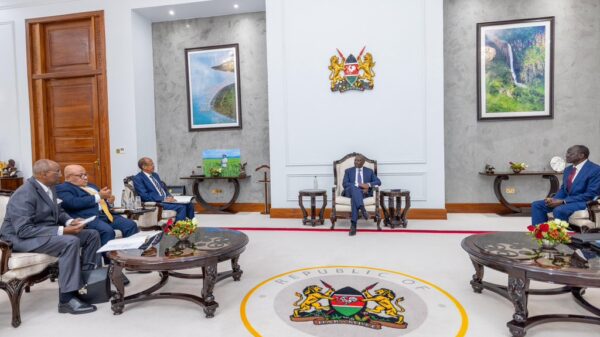
US Secretary of the Treasury Steven Mnuchin arrives for a press conference at the G20 Finance Ministers and Central Bank Governors Meeting in Baden-Baden, southern Germany, on March 18, 2017 © AFP / THOMAS KIENZLE
Baden-Baden, Germany, Mar 17 – The United States on Saturday challenged long-standing global principles surrounding free trade, refusing to renew past anti-protectionist pledges and threatening to reopen negotiations on World Trade Organization deals.
In an early taste of what Donald Trump’s “America First” push spells for the world, finance ministers from the G20 group of developed and emerging nations failed to get Washington to sign off on a pledge to reject protectionism in a closing statement.
Commitments of support to the existing multilateral trade system, including the World Trade Organization (WTO), were also conspicuously missing from the final communique.
And an entire section on action against climate change was dropped, sparking dismay among America’s partners as well as environmental activists.
Treasury Secretary Steven Mnuchin shrugged off the outcry, saying the “historical language” was not relevant.
“What is relevant is what we agreed as a group: to strengthen the contributions of trade to our economies,” he said.
“We will strive to reduce excess global imbalances to promote inclusiveness and fairness and reduce inequality,” he added, stressing that what Washington seeks is “free and fair trade” that is good for both Americans and the world.

GDP of G20 member countries © AFP / Gal ROMA
But trade deals that currently exist are not always balanced, he said, warning that Washington will not hesitate to renegotiate them.
“We want to reexamine certain agreements, we have talked about reexamining NAFTA,” he told journalists, referring to the North American Free Trade Agreement between Canada, Mexico and the United States.
“We think there are parts of the WTO that are not being enforced, and will look to aggressively enforce things in the interest of American workers,” he added.
“To the extent the agreements are old agreements and need to be renegotiated, we’ll consider that as well.”
– ‘Free but fair trade’ –

US President Donald Trump insisted at a tense Washington press conference Friday, following his first meeting with German Chancellor Angela Merkel, that “I’m a free trader but also a fair trader” © AFP / SAUL LOEB
Carried to power on the back of a political storm over deindustrialisation in vast areas of the US, Trump vowed in his inauguration speech to “follow two simple rules: buy American and hire American.”
His strategy includes threats to penalise companies that manufacture abroad by heavily taxing their products.
Since taking office, Trump has withdrawn the US from a trans-Pacific free trade pact and attacked export giants China and Germany over their massive trade surpluses.
His stance has been condemned by Washington’s trading partners, and led Beijing to issue a stern warning against sparking a trade war.
Trump himself insisted at a tense Washington press conference Friday, following his first meeting with German Chancellor Angela Merkel, that “I’m a free trader but also a fair trader”.

People rally calling for the cancellation of third world debts during the G20 Finance Ministers and Central Bank Governors Meeting in Baden-Baden, southern Germany © dpa/AFP / Lino Mirgeler
He rejected a description of his policies as “isolationist”.
French Finance Minister Michel Sapin expressed “regret that our discussions today were unable to reach a satisfying conclusion on two absolutely essential priorities,” trade and climate.
“Our world and France would have liked to see the G20 continue to take firm and concerted action,” he added.
Host German Finance Minister Wolfgang Schaeuble however struck a conciliatory tone, suggesting that Mnuchin was not empowered to act on some issues.
And IMF chief Christine Lagarde said the new White House simply needed time to “adapt and learn”.
– ‘No sense in fighting’ –

Treasury Secretary Steven Mnuchin acknowledged that environmental issues such as the 2015 Paris agreement were “not in my track” © AFP/File / FRANCOIS GUILLOT
The US treasury chief himself acknowledged that environmental issues such as the 2015 Paris agreement were “not in my track”.
“President Trump is looking at the Paris treaty and other treaties and the administration will have views on that as they consider their policies,” Mnuchin said, adding that was “more of an issue for G20 leaders and less of an issue for finance ministers”.
But activists say the exclusion of climate marked a new setback for environmental action, after Trump proposed to take an axe to green financing.
Under his first national budget proposal, he suggested cutting financial resources for the Environmental Protection Agency (EPA) by a third, as well as eliminating contributions linked to UN climate change programmes.
On the campaign trail, Trump had threatened to pull the US out of the Paris Accord on combating climate change.
Greenpeace East Asia’s Li Shuo blamed Washington for a G20 statement that he said showed a “lack of attention to climate change”.
“Other countries should not allow this to happen again,” he added.
EU Economy Commissioner Pierre Moscovici acknowledged that “it was a complicated meeting with a temporary conclusion that could be better but we are working on it.
“And I hope for a better conclusion in four months in Hamburg,” he said, adding that given it was the “first contact with this new administration, it would have made no sense to enter into a fight.”

































